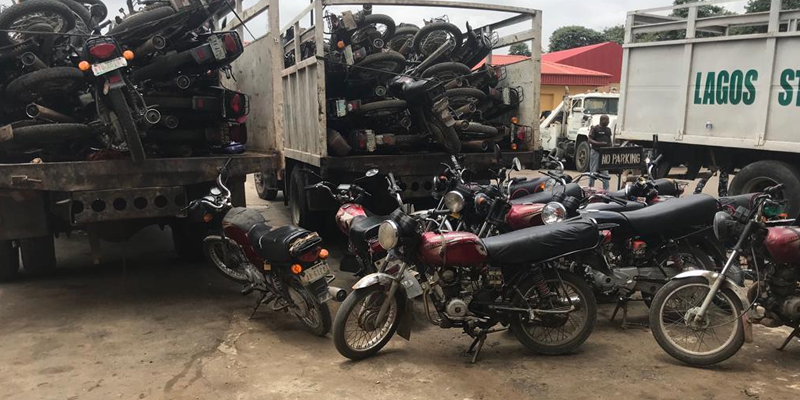In recent weeks, the hinterland areas of Lagos State, particularly Okeodo and Iyanaipaja, have been the focal points of an intense and controversial police task force operation targeting motorcycle operators. While aimed at curbing illegal activities and enhancing public safety, the raid has faced backlash for its perceived overreach and its severe impact on families whose daily lives depend on the motorcycle business, commonly known as “Okada.”
The police task force’s operation in Okeodo and Iyanaipaja was ostensibly conducted to address concerns about the misuse of motorcycles in criminal activities and to enforce regulatory measures. However, the raid, which occurred over several days, has been described by many as heavy-handed and indiscriminate.
For instance, in Okeodo, a bustling area with a significant population reliant on motorcycle transportation, officers confiscated numerous bikes, many of which were found to have valid documentation. The scene in Iyanaipaja was similarly chaotic, with local businesses and residents expressing frustration over what they perceive as a blanket approach to enforcement. The crackdown not only targeted motorcycles used for illicit purposes but also affected those operated by individuals who use them as a primary source of income.
For many in Okeodo and Iyanaipaja, motorcycles represent more than just a mode of transport; they are a vital livelihood. The Okada business supports numerous families who depend on their daily earnings to make ends meet. The sudden seizure of motorcycles has left many without a source of income, exacerbating financial difficulties and causing severe disruptions to their daily lives.
Residents of these areas report to www.consumersassembly.com that the raid has led to a wave of economic hardship. Families are struggling to cover basic needs such as food, rent, and healthcare due to the abrupt loss of income. Small businesses that relied on motorcycle deliveries are also suffering, creating a ripple effect throughout the local economy.
Also, community’s response to the raid has been one of discontent and despair. Local leaders and activists have voiced concerns about the lack of consideration for the legitimate operators who have been unfairly affected. Many residents argue that the operation’s indiscriminate nature undermines the principles of justice and fairness.
“While we understand the need to tackle crime, this approach is not fair to those of us who rely on our motorcycles for survival,” says Frank Adesoji , an Okada rider from Okeodo. “The task force has not distinguished between the criminals and the hardworking individuals trying to make a living.”
Critics of the raid argue that the task force’s methods may have been too extreme and poorly targeted. Instead of focusing solely on those engaged in criminal activities, the operation seemed to penalize a broader segment of the population. The lack of clear communication and the sudden nature of the enforcement have raised questions about the effectiveness and appropriateness of the approach.
Human rights organizations and local advocates have called for a review of the operation’s tactics and a more nuanced strategy that does not disproportionately impact vulnerable communities. They advocate for targeted enforcement measures that focus on actual offenders while providing support and alternatives for those affected by the crackdown.
As the situation unfolds, there is an urgent need for dialogue between law enforcement agencies and the affected communities. Stakeholders are calling for: A more precise approach to identifying and addressing illegal activities without disrupting the livelihoods of legitimate operators. So also, initiatives to assist those who have been adversely affected by the raid, including financial aid, alternative employment opportunities, and support for businesses hit by the crackdown.
Our Stand
The recent police raid in Okeodo and Iyanaipaja has sparked significant controversy and distress among local residents. While the intention to combat criminal activities is understandable, the execution of the raid has led to unintended consequences for many families who depend on the Okada business for their livelihoods. Addressing these issues requires a balanced approach that considers the impact on vulnerable populations while effectively tackling crime. Moving forward, it is crucial for authorities to refine their strategies and engage with the community to foster a more equitable and supportive environment for all.









